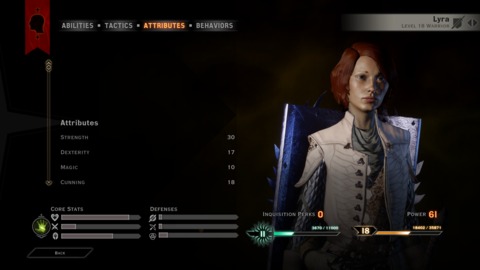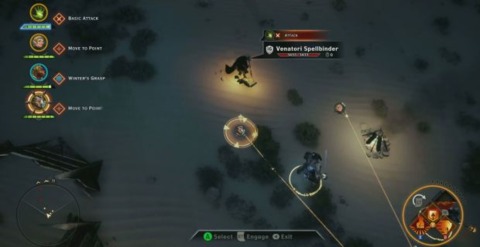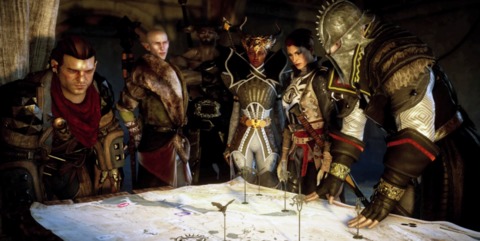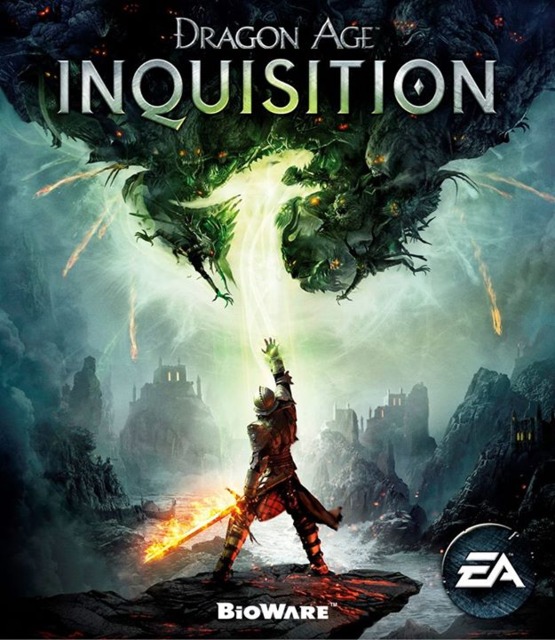Not a great gameplay experience, but one of the best casts of RPG characters to date

I was pretty skeptical about Dragon Age: Inquisition before it came out. Dragon Age II’s poor development hadn’t shaken my faith in Bioware like most people, as I thought DAII still had a story and cast of characters that made it worth playing at least once. Instead, my fears for Inquisition stemmed from the new big-budget nature of the project. EA was obviously putting a lot of faith and money into development, making me worry that the soul of past Bioware releases would be lost to homogenization and appeasement to the masses. While I do think that it slides too far from its roots in certain areas, Inquisition is an impressively ambitious game, putting the money and muscle of its publisher to work without losing what makes a Bioware game so fascinating to experience.
After the events in Kirkwall at the end of Dragon Age II, the conflict between mages and templars is more chaotic than ever. Mage Circles around Thedas has dissolved, resulting in numerous splinter factions striking out on their own. The templars have seceded from the Chantry in order to seek out the mages and bring them back under their control. Skirmishes break out across the land, involving countless innocents in their wake. In hopes of finally ceasing the civil war, the Divine (leader of the Chantry) calls a peace conference between mages and templars. Before these talks can begin, however, a massive explosion rocks the meeting with no warning. This explosion levels the surrounding area and opens a breach to the demon realms of the Fade in the sky. The only survivor of this event finds him/herself seared with a crackling brand on the left hand, created by the same energy that surrounds the Breach and the only way to seal rifts to the Fade. With the power of this new mark, the survivor must join forces with those trying to pick up the pieces, attempt to seal the Breach, and uncover the mysteries of how it came to be in the first place.
The core narrative of Dragon Age: Inquisition is perhaps its weakest element. The big setpiece moments, such as one early mission that tasks you with fighting a losing battle to protect your home base of Haven, are its few moments of glory. This mission features some intense fighting, the reveal of the game’s main villain, and a powerfully emotional moment that managed to both send a shiver down my spine and get me pumped to play more. It’s a sensational set of events that demonstrates the strengths of Bioware’s team. Truly exceptional story moments such as this, however, are few and far between, interspersed with a lot of busy work and requisite grinding to trigger the next set of events. I also had issues with the main villain, a lame attempt at badassery. He is spoken about in hushed tones by the cast of the game throughout its length, yet he never uses this incredible power to simply crush your Inquisition before it can begin, instead staying silent as you build the necessary alliances and power to stop him. Maybe not the best plan? You finally get to fight him in the game’s ultimate encounter, but it’s a laughably easy affair that makes him appear even lamer. The way you are unceremoniously dumped directly into the fight is particularly bad as well, throwing pacing and dramatic tension out the window. Worst of all is the final tease of a cliffhanger the game leaves you with, a short scene which makes little sense and feels poorly earned. It’s not a bad story, per se, but the things it does best will really only appeal to those heavily invested in the Dragon Age lore, fans who understand the importance of key moments and recognize the (numerous) cameos.

Thankfully, Dragon Age: Inquisition more than makes up for iffy story with its characters. This cast of characters is the best cast in a Bioware game to date, maybe even one of the best in RPGs period. Each of them is remarkably unique and offers entertaining scenes and superbly delivered lines of dialogue with every conversation. I think Sera, a brash elf with a hatred for anyone who steps on the little people of society, is the shining example of Inquisition’s characters, packing a lot of personality and some of the funniest moments in the entire game. The return of Leliana, my favorite character from Origins, was a great surprise, and Bioware manages to build on her established character in some unexpected ways. Even some of the minor supporting characters, such as a surprise cameo from adorable little Dagna (also from Origins), deliver lines of a quality you wouldn’t necessarily expect from “throwaway” characters. That’s not to say I like all of the characters. Vivienne is a snobby bitch that always got on my nerves with her backwards views on mages and their freedoms, even though it was likely intentional on the developer’s part. Warden Blackwall is the worst, with a personality about as interesting as cardboard. Even the characters I hated had their moments, giving them enough weight and meaning to make them an inseparable part of the main cast. Inquisition manages to defy the already lofty expectations for Bioware characters, sending me back to each of them time and time again to learn as much as I could. In fact, I spent several hour-plus sessions happily chatting with them in Skyhold, which I think speaks to the quality of the writing and voice acting.
These characters felt real in many ways, but one particular moment impressed me most of all. It came from Cassandra, a Seeker who is the driving force behind the Inquisition and your first party member. Throughout the game, I took any opportunity to flirt with her that I could, finding her dialogue and backstory intriguing and wanting to see where my flirtations would take me. She usually brushed me off, not out of anger or coldness but out of embarrassment: something which endeared her to me even more. As the game went on, her responses became more amiable and I felt I was getting her to open up to her feelings about me. Out of the blue, however, she then took me somewhere private and requested that I stop flirting with her, stating that she couldn’t return my affections. At this point, I will note that my Inquisitor was an elven female and that Cassandra is not romanceable by women. Originally, I didn’t even realize this was the case: I had just thought that she wasn’t a potential romance option for anyone. Instead of simply not allowing my character to even attempt flirtation with someone who wouldn’t return my affection, Bioware opted instead to give players the option and have Cassandra herself make it clear that I wasn’t her type. It’s a small touch that made me wonder if Bioware thought of everything in regards to their characters.
Gameplay in Dragon Age: Inquisition follows a pattern that fans of recent Bioware games will find familiar. Main story missions and companion missions are given to you in your home base, tasking you with heading out into the world and completing some task. You explore these mission areas, fighting enemies and completing quest objectives along with searching for loot and crafting materials. Side quests and other activities can be found all over the huge zones, tasking you with smaller objectives for extra XP. When you’re finished, you head back to town for your rewards and a bit more story or dialogue from your companions. Exploration is actually quite fun, as zones are gorgeously designed and compelling enough to want to traverse. Skyhold, your main base, is filled with tons of small areas to find that make it feel like a real place. All of the zones are packed with so much to do that it can easily be overwhelming the first time you visit one. While this gives the exploration a nice Bethesda-esque feel, urging you to crest just one more hill before leaving a zone, the quality levels of this content are variable. Side quests found in zones are sometimes impressive, such as one about a town fighting a constant onslaught of undead from a nearby lake, but most of them are boring fetch quests. Collectibles give decent loot incentives for completion, yet require a lot of busywork to fetch. It’s hard not to feel tedium every now and then, particularly in those lull periods between main story missions where you simply must grind out levels and power to progres. This glut of content feels like a strong response from Bioware after complaints of Dragon Age II’s thin content and reused areas. It’s appreciated that they didn’t want to cut corners again, but Inquisition maybe has too much filler content.

The vast majority of your actual gameplay time will be engaging in combat with your foes. Combat feels like an evolution of Dragon Age II, moving further away from the tactical feel of Origins and becoming something more akin to an action game. You won’t be juggling enemies or utilizing button combos, but it’s about as close to that style as an RPG tends to get nowadays. There are cooldowns and energy systems to manage, preventing you from spamming your special attacks frequently. For the rest of the time, you can simply hold down a trigger (or mouse button) and auto-attack your target. Encounters are flashy, with so many spell effects firing off at times that it can be hard to tell what the hell is even going on. It looks fantastic, energetic and believable, but I often felt a disconnect between my actions and the actions of my controlled character. I played as a melee tank and had trouble at times actually connecting with my foes. Hitboxes seem painfully small on certain enemy types, forcing you right up in the face of your target to actually make contact. Even with perfect positioning, I found myself not connecting with my strikes more often than I liked. This happens frequently when uneven terrain enters the mix, as even a small hill would often cause my character to whiff her attacks. I’m unsure if this issue persists with ranged-based characters, but my personal experience as a melee class was one of frequent frustration with simple targeting and attacking.
I also had issues with how tedious the combat eventually became. Like many Bioware games, Dragon Age: Inquisition maybe has a bit too much combat. Some zones are so packed with foes that you can barely walk a few feet without running into another encounter. There’s a decent variety of enemies, but you’ll still be painfully familiar with the array of foes by the end of the game. On Normal difficulty, you barely even have to mix up your tactics for different enemies, barring one or two particular types. I could often just hold down a trigger and watch my AI companions do all the busy work for me, with no real incentive to actually use strategy. Because of this, I didn’t enjoy most of my time with the combat in Inquisition. It felt like a constant slog, getting in the way of the story and character moments that I actually wanted to see. Admittedly, this may be because I chose to play a tank, a class that uses many passive and buff abilities and does little damage to its foes. If I had played as a fire-slinging mage or a stealthy backstabber, maybe I would have felt differently. From my experience, however, I don’t think that combat is the reason to play Inquisition, as it simply isn’t engaging enough to be the main appeal.
Your companions’ AI has some significant issues as well. Bioware opted to minimize the tactics options from prior games, if-then statements that allowed you to set how and when each member would use his/her skills. I can understand why it wasn’t included here, as the increased focus on action and removal of healing spells makes it less necessary. While companions in Inquisition sometimes fail to cast preferred spells (which you can flag manually, giving it a higher priority), the issue doesn’t come from a boiled-down tactics menu. Instead, it comes from AI that feels poorly designed at its core. Companions make strange decisions, such as ranged fighters moving up close to enemies for no legitimate reason. The best example I have of the annoying AI is with Iron Bull, a two-handed melee-focused party member I used for most of the game. Smart AI would stay behind foes, avoiding the swipe effect that most melee strikes tend to have. Iron Bull instead opted to stand right where I was standing--in front of foes, tanking--and take bunches of unnecessary damage, dying frequently. While I wasn’t a part of development, I don’t see how hard it would have been to have melee characters like Iron Bull opt to attack from the back whenever they aren’t the focus of their target. On the whole, I never felt like I could fully rely on the AI of my party members, even with the relative simple difficulty of Normal. I shudder to think how Nightmare would be with such shaky AI behavior.

There are two other important gameplay systems to note. The War Table is where you use your advisors and their resources to tackle automatic timed missions, similar to something like Assassin Creed’s fleet system or the new Garrisons from World of Warcraft. After choosing where to send each advisor, you wait the given period of real-world time and receive a reward for completion. This is a gameplay system that has been enjoyable in other games, but Bioware didn’t do a great job with it. You have only three people to send out, making it time-consuming to clear out the whole map. Few of the rewards are worth getting, and the valuable ones are the missions that take the longest to complete (over a day, usually). Worst of all is that you can only view this system at your home base, forcing you through several loading screens to collect rewards and send people out again. The game also features a basic crafting system, where schematics for new gear can be found and created with various materials. You collect these materials out in the world, gathering herbs and ores or picking up skins and objects from defeated foes. The rewards for crafting can be huge, with the best gear in the game coming from high-end schematics, but it’s a tedious affair to craft even one piece of this gear. You need a LOT of materials to make the best stuff, forcing you to stop frequently when out in the world and suffer through the much too long collection animation. This is an optional part of the game on Normal difficulty, but you won’t find the best gear anywhere else.
I played Dragon Age: Inquisition on the PC, and it was a mostly pleasant affair. It’s a beautifully vibrant experience and runs smoothly, even on my mid-range GTX 660 card. Unfortunately, I did also have a few problems from time-to-time. Switching between keyboard+mouse and controller input is not as seamless as it could be. Plugging in a controller shuts off ALL input from the keyboard, meaning you can’t even quicksave or take a screenshot with the hotkeys. It’s a boggling thing to see in a modern PC version of a AAA game, but it’s not much more than a minor annoyance. Near the end of the game, I started having a glitch where party members refused to use any of their abilities, making fights nearly impossible; however, it sounds like this is a bug common to all versions of the game, not just the PC version. Bizarrely, a few of the zone transitions featured a bug where it would instead load me back into the same area (after a VERY long load) and with all the scripting broken. Changing my positioning slightly before entering the new area always fixed this error, but I have no idea what could have caused it. Finally, the game crashed to desktop a handful of times; thankfully, I never lost any major progress. On the whole, I was quite pleased with the PC version of Inquisition. If you have the option, I highly recommend it for the visuals alone.
I think it’s safe to say that the characters and moments of Dragon Age: Inquisition are what saved it for me. Every time I found myself annoyed by the main story or bored by the repetitious combat, I just remembered that it would lead me to more conversations with a cast of characters I truly loved. Learning about my diverse group of companions was so much fun that I would have played a game without the bland gameplay just to get to know them. That’s not to say that the gameplay is entirely without merit. Exploring the vast areas around Thedas may be tiring at a point, but each is visually stunning and exciting for at least the first hour of prodding. The story may be weak, but it features some fantastic moments that are absolutely worth seeing. I’m still shocked that I ended up enjoying Inquisition as much as I did, finding myself excited to see what comes next out of Bioware for the first time in forever. I’m a bit scared that further gameplay dilution may be in the future, but if the writing and voice acting continue to be this good, I don’t really care.
